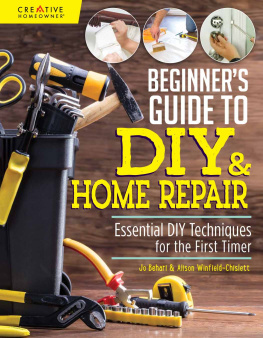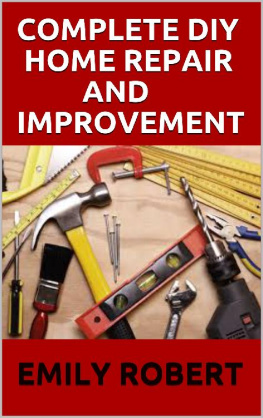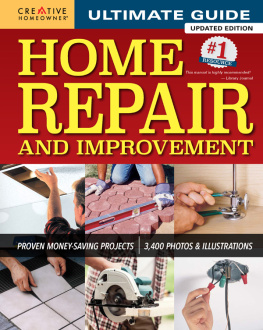Born in Orange, NSW, Scott McGregor has never been far away from the tools, having spent much of his spare time renovating houses, fixing antiques and restoring vintage railway carriages. He is a graduate of NIDA who has appeared in countless TV dramas, films and plays and presented numerous documentaries on Australian history and railway journeys. He was the DIY presenter on Channel Sevens Better Homes and Gardens and the host of the highly successful series Room for Improvement. For many years Scott also owned the railway-buff mecca called Off the Rails, specialising in industrial antiques.
Scott writes a weekly DIY column for the Sun-Herald called Weekend Workshop and as if thats not enough you can find him regularly appearing at Ladies Nights at Bunnings hardware stores where he shares his passion for shellac (amongst other things). Scotts biggest fix it project is his railway retreat, Ruwenzori, near Mudgee, which is an ongoing labour of love.
FIX IT
How to do all those little repair jobs around the home
SCOTT McGREGOR

First published in 2007
Copyright Scott McGregor 2007
All rights reserved. No part of this book may be reproduced or transmitted in any form or by any means, electronic or mechanical, including photocopying, recording or by any information storage and retrieval system, without prior permission in writing from the publisher. The Australian Copyright Act 1968 (the Act) allows a maximum of one chapter or 10 per cent of this book, whichever is the greater, to be photocopied by any educational institution for its educational purposes provided that the educational institution (or body that administers it) has given a remuneration notice to Copyright Agency Limited (CAL) under the Act.
Allen & Unwin
83 Alexander Street
Crows Nest NSW 2065
Australia
Phone: (61 2) 8425 0100
Fax: (61 2) 9906 2218
Email: info@allenandunwin.com
Web: www.allenandunwin.com
National Library of Australia
Cataloguing-in-Publication entry:
McGregor, Scott, 1957- .
Fix it : how to do all those little repair jobs around your home.
Includes index.
ISBN 9781741753264 (pbk.).
1. Do-it-yourself work - Amateurs manuals. 2. Dwellings
Maintenance and repair - Amateurs manual. 3. Repairing
Amateurs manuals. I. Title.
643.7
Edited by Michael Wall
Internal photographs by Wendy Gray
Indexed by Russell Brooks
Text designed by Seymour Designs
Set in 10 pt Grotesque MT Lt by Midland Typesetters, Australia
Printed and bound in Australia by Griffin Press
10 9 8 7 6 5 4 3 2 1
To my wife, Wendy Gray, for all your hard yakka, keyboard work and laughs. Your support, dedication, and direction has been the force keeping this little two person team firmly ON the rails.
To Poss and Doug (Mum and Dad) for your inspiration. Thanks for putting this sign up in the sunroom:
The person who says it cant be done is likely to be interrupted by somebody doing it.
Special thanks to Darryl Chapman my right-hand man in all matters handy, for being a fine hunter of the how-to and a gatherer of great stuff.
And thanks to my agents Lisa Hanrahan and Mark Byrne for your ideas, encouragement and advice.
CONTENTS
Chapter 1
HOW I GOT HOOKED
The weekend is upon us and in the ideal world the sun is shining, the birds are singing and the kids are happily mucking round in the yard. The missus is indulging in some quality me time, and so am I. If anyone wants me Im in the shed, I holler as I gallop off to the inner sanctum of my big boys toy shop. They know I may be some time.
My day of doodling is a journey that may involve making, restoring or fixing something, doing projects that could be straightforward or more of a challenge. But often its simply play time, R&D in the laboratory of home improvement if you like. A trip to the hardware can end up being hours of hard-core study; having the blokes around to join in on a debate at the Institute of Backyard Studies (thanks to Mark Thompson) can lead to some surprising results. But its all in the name of being able to Do It Yourself.
It seems all my life Ive been in homes or jobs that have encouraged me to be handy, but in the beginning I was thrust into a DIY mindset by a family philosophy founded on the pioneering and Depression era mentality of fixing everything and making use of anything. Dads mantra was that theres nothing you cant fix with a bit of tie wire and some Araldite. Exactly what this combination did was always a mystery to me, but he was never without these ingredients in his messy little fixing kit.
Together he and Mum would scour the country auctions and clearing sales for bargains, hauling these dilapidated treasures back home to be transformed. In the process they turned our backyard and our various sheds into smelly furniture-restoration sweatshops, but over the years they successfully furnished the old farmhouse with an impressive collection of bargain basement antiques.
The last thing I wanted to do as a kid was get my hands dirty with paint stripper and methothe clay walls of the local creek and the creativity of my mate Flarkie were far more appealing DIY options, as was the distraction of the nearby railway and its passing parade of monstrous steam trains, which I just loved to watch. But I was always amazed at the results of Mum and Dads hard work as another piece of cedar would eventually be added to the Victorian clutter of Rahiri (near Orange), making the place look like a cross between the set of On Our Selection and The Madness of King George.
Something mustve rubbed off, because at the age of 13 I found myself compelled to put up my hand at a local auction sale, and ended up spending seven dollars of my hard-earned paperboy pocket money on a twee little blue-painted cedar meat safe. Over the next few months, in between projects for woodwork at school and learning lines for the school plays that Id also become addicted to, it got the full treatment as my first serious fix-it project. Ive still got the piece and its a survivor, unlike the things I built in woodwork, reminding me that even then it was evident that my skills were more attuned to fixing and restoring than to building stuff. Its no wonder that the family tradition of trying to fix things myself was to be my main direction.
In my twenties, when I actually had a bit more than a paperboys wage from a couple of lead roles in TV miniseries, I hit upon the potential for a really big antique restoration job that would act as a weekender-with-a-difference on our family acres at Mudgee: a vintage railway carriage. Now, even though the purchase and moving costs were less than knocking up a simple shed, the real attraction was the idea of living a bohemian existence in a train, a quirky place to play and stay for friends and family, and a restoration challenge for the novice McGregor with his grand vision for an off-the-rails Orient Express.
At Ruwenzori, my own DIY life-size train set!
This exercise was to set in train, pardon the pun, a journey that opened up a range of opportunities and cultivated my interest in the arena of hard-core DIY. The search for spare parts for my new train took me to the far corners of the railway network at a time when the dismantling of this vast empire was well underway. Each new acting job meant a new carriagean instant extension if you like. Regular assistance, additions and advice from mates, some of whom were carriage builders themselves, was adding simultaneously to my knowledge bank in a big way, as well as breathing new life into these old trains.
Next page





